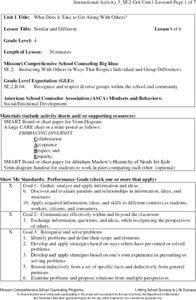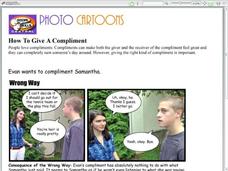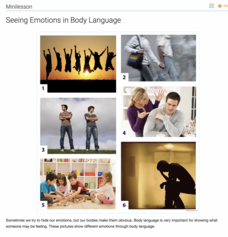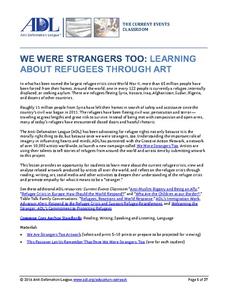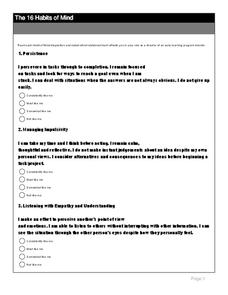Missouri Department of Elementary
Similar and Different
Using a Venn diagram, pupils compare the similarities and differences between two classmates. Next, they review the CARE acronym (Collaboration, Acceptance, Respect, Empathy) and discuss how it applies to diversity in the classroom.
Social Skills Central
Photo Cartoons: How To Give A Compliment
Help learners develop the ability to offer appropriate, meaningful compliments to others—an essential social skill. Here you'll find a quick photo cartoon illustrating a right and wrong way to give a compliment, as well as a brief...
Community High School of Vermont
Habits of the Mind
An informative one-page resource details the 16 Habits of Mind. Habits encourage positive problem-solving, self-awareness, creativity, and dedication—lifelong skills that can be used in both academic and social settings.
Missouri Department of Elementary
Juggling New Opportunities
Life is like trying to juggle three tennis balls! That's the big idea in a lesson that asks freshmen to consider that sometimes juggling the areas of their lives (social/emotion, academic, and career) runs smoothly and sometimes not so...
Overcoming Obstacles
Resolving Conflicts
A lesson about resolving conflicts guides young scholars through the process of identifying emotions and reflecting on the situation, all before taking action. The lesson encourages class members to stay open-minded and listen to the...
Nemours KidsHealth
Empathy: Grades K-2
Second graders read articles about being afraid, dealing with anger and apologizing. In this feelings lesson, 2nd graders read articles and discuss the feelings they have. Young scholars describe their feelings and how to be supportive...
Read Works
Cool to Be Kind
Make a connection between empathy and bullying with a reading passage that has readers thinking about other people's feelings. After reading, learners respond to ten reading comprehension questions involving short answer and multiple...
Museum of Disability
Rolling Along
Kindness and empathy can be as important as reading comprehension skills, especially for younger learners. Reinforce both with a instructional activity based on Rolling Along: The Story of Taylor and His Wheelchair by Jamee Riggio...
Anti-Defamation League
Dealing with the Social Pressures that Promote Online Cruelty
Why do people engage in cyberbullying? What can be done about it? These are the questions middle schoolers consider in a very timely lesson. Participants view PSA announcements, read a case study, and participate in scenarios designed to...
Facebook
Respect and Boundaries
Respect is a must-have in healthy relationships! Pupils explore their boundaries and identify the elements of respect during a lesson from a library of digital citizenship activities. The teacher's resource section contains a printable...
Thoughtful Learning
Seeing Emotions in Body Language
Scholars test their skills of reading body language with a collaborative learning experience that focuses on showing and identifying emotions. Pairs take turns acting out an emotion, one uses body language while the other guesses what...
Museum of Disability
A Picture Book of Louis Braille
Teach kids about the beginnings of the Braille writing system with a lesson about Louis Braille. A series of discussion questions guide young readers though A Picture Book of Louis Braille by David A. Adler, and once they finish the...
Partners Against Hate
Building Community and Combating Hate
Put a little love in your classroom! Help middle school scholars understand differences among people and build a sense of community within their school through 10 well-organized lessons. Each unique lesson incorporates writing,...
Facing History and Ourselves
Protesting Discrimination in Bristol
Using the Bristol Bus Boycott as a case study, class members examine the strategies and levels of power protesters used to effect change. The two-day lesson concludes with individuals reflecting on the actions they might take in face of...
Greater Good Science Center
See The Good Challenge
Scientists study all sorts of things. For example, studies show that it feels good to feel grateful. Feeling grateful also contributes to physical health and strengthen relationships. In the second lesson about gratitude, class members...
Anti-Defamation League
‘Migrant Caravan’ and the People Seeking Asylum
The controversies surrounding migrants seeking asylum in the U.S. have recently been a hot topic. To understand some of the issues involved, young scholars investigate the Migrant Caravans of 2018. A 10-page packet, including photos, a...
Museum of Disability
Ian’s Walk and Apples for Cheyenne
Help young learners understand friendship and empathy with two reading comprehension lessons. Each lesson focuses on a story about a child with autism, and encourages readers to compare and contrast the characters to each other and to...
Anti-Defamation League
We Were Strangers Too: Learning About Refugees Through Art
Did you know that "in the largest refugee crisis since World War II, more the 64 million people have been forced from their homes"? The Anti-Defamation League presents an activity that asks class members to examine a series of artworks...
Curated OER
Words Hurt
Young scholars identify the various forms of bullying in a class discussion and to sort out the situations that can hurt outside and inside. They count the number of bullying incidents posted on the bulletin board to find which occur...
Museum of Disability
Taking Visual Impairment to School
What is the world like when you can't see, or when your vision is impaired? Learn about how Lisa communicates with the world around her with Taking Visual Impairment to School by Rita Whitman Steingold. Learners answer discussion...
Council for the Curriculum, Examinations and Assessment
Managing Influences and Making Decisions
Teenagers could use a little help with their decision-making process. Guide them through the steps of mature choices, outside influences, and expected consequences with a lesson about making decisions.
Thoughtful Learning
Recognizing Bullying
Boost social awareness with an activity that challenges scholars to recognize bullying. Participants read 10 scenarios and respond after carefully examining behaviors such as body language, facial expressions, and frequency.
Thoughtful Learning
Doing Random Acts of Kindness
Encourage scholars to perform random acts of kindness. A lesson challenges participants to choose a peer they wish to be kind to without them knowing. Learners list five good deeds and choose one to fulfill. Pupils reflect on the process...
Center School
The 16 Habits of Mind
Which of Costa's 16 Habit of Mind best describes you? Take a short assessment to see which quality is most consistently like you, or which quality is not like you at all.


